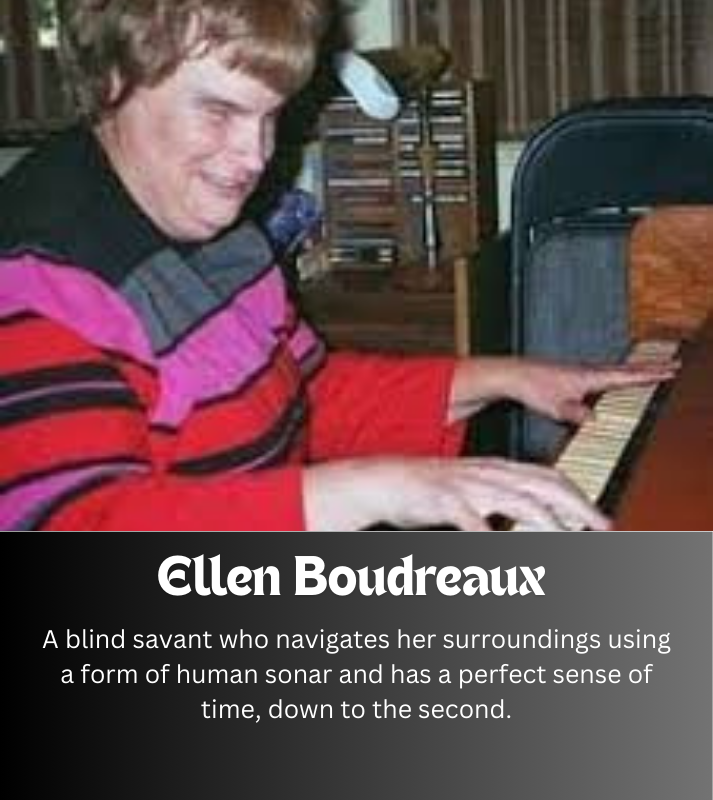Ellen Boudreaux
The Savant with a Clock in Her Mind


Ellen Boudreaux is a remarkable individual known for her extraordinary musical talent and an uncanny, near-perfect sense of time. She is a shining example of a savant, a person with significant developmental or intellectual disabilities who exhibits a singular, profound skill that stands in stark contrast to their general cognitive functioning.
While some popular accounts have mentioned her using a form of "human sonar" to navigate, documented scientific sources primarily focus on her well-known abilities in music and time perception, which are exceptional even within the context of savant syndrome.
A Musical Prodigy with Perfect Pitch 🎹
Born blind, Ellen Boudreaux is a musical savant. She began humming tunes from the radio at just six months old and taught herself to play the piano and guitar with no formal training. Her skills are not just about playing by ear; they are a form of profound auditory memory and analysis. Her musical talents include:
Perfect Recall: The ability to hear a complex piece of music once and then play it back flawlessly on the piano.
Genre Transformation: She can take a song and instantly adapt its style, for instance, playing a classical piece in a jazz style.
Complex Composition: She has the ability to compose intricate chords and melodies to accompany any tune she hears.
Her musical gifts are a clear manifestation of auditory savant skills, which often include perfect pitch and an encyclopedic memory for sounds.
Ellen Boudreaux: The Savant with a Clock in Her Mind
The Digital Clock in Her Mind ⏰
One of Ellen Boudreaux's most fascinating and well-documented abilities is her perfect sense of time. Without any external cues like a watch, she can tell you the exact time of day, down to the minute and, in some reports, even the second. This ability is a rare but documented trait in some savants, particularly those who are also calendrical calculators (individuals who can instantly determine the day of the week for any given date).
This skill is not about guessing; it is a profound internal perception. It is thought to be tied to an extraordinary internal "clock" or an enhanced ability to process the flow of time on a neurological level, a skill that is largely unconscious and effortless for her.
Human Echolocation: The Science of "Seeing" with Sound 👂
The idea of a blind person navigating using sound is not a myth—it's a real and scientifically documented ability known as human echolocation. However, it is a skill that is developed and learned, not an inherent savant ability. While Ellen Boudreaux's mastery of time and music is well-documented, her use of echolocation is less so. It is more likely that her abilities are being conflated with the more prominent, highly-documented cases of blind individuals who have trained themselves in this skill.
How it Works: Like bats and dolphins, people who practice human echolocation generate sounds—most commonly by making a clicking noise with their tongue—and then listen to the echoes that bounce off nearby objects.
Brain Rewiring: Scientific studies using fMRI have shown that the brains of expert human echolocators process these echoes in the visual cortex, the part of the brain normally used for sight. This incredible finding demonstrates the brain's neuroplasticity and its ability to repurpose areas to adapt to new sensory information.
Notable Experts: Some of the most famous practitioners of human echolocation include Daniel Kish and Ben Underwood, who have used the skill to navigate complex environments, ride bicycles, and even play sports.
While Ellen Boudreaux is a true "one in a million" for her musical and time-keeping talents, the phenomenon of human echolocation is a different, albeit equally fascinating, topic that showcases the brain's remarkable capacity for adaptation.
Discover the extraordinary and unique stories.
Inspire
© 2025. All rights reserved.
